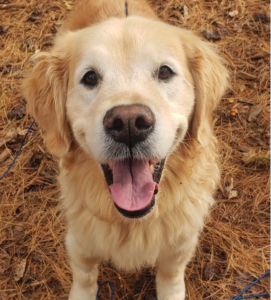ASHEVILLE, NC – April 1, 2024 – Grief can affect your mental and physical health particularly after the loss of a member of the family. We can develop such a close relationship to a pet (like a dog or a cat) that we consider our pet to be a member of our family. A feeling of grief in response to the loss of a pet may be similar to the loss of a person. However, the grieving process is different for everyone. According to the American Psychological Association, “grief is the anguish experienced after significant loss.” I definitely think that this applies to the loss of a pet.
Jennifer Breslow, a psychotherapist who specializes in pet loss counseling, said, “The death of a pet is a devastating loss and people often feel overwhelmed by the emptiness and void they feel when their pet is gone.” She added, “Grieving is a process that takes time and is filled with a mess of uncomfortable feelings. But it is temporary and a normal human response to a significant loss.”
I lost my beloved companion Brady on April 1st at the age of 13 . He was a majestic-looking golden retriever who was always happy to see me with his tail-wagging, infectious smile, and frequent licking. We had many great times together and Brady did some crazy things. After he passed, I read that there is a 61% risk that this popular breed will develop cancer. In 2010, I lost my first golden retriever Rocky to cancer at the age of 11. His passing brought me many days of grief. When I finally got over it, we brought home Brady, one year later.
After age 11, Brady developed 4 different cancers at 4 different times. Three of his cancers got better with surgery. However, the 4th cancer had the worst prognosis because it was destined to spread.
Amputation and chemotherapy prolonged his life for 8 months. After 1 month recovering, he had 6 good months of being a happy dog. He was running with 3 legs and still had a great life. A second round of chemotherapy was begun after the cancer spread to his lungs one month ago. However, he had severe complications and was unable to walk much. There was a brief improvement, followed by a regression over the final 2 weeks.
It isn’t a good sign when your dog barks to be helped up to go to the bathroom or wants a new location in the yard or the house. When Brady refused to eat his meals, including his favorite treats, we knew that his quality of life had been severely compromised.
When a close relative passes, people pass through the 5 stages of grief as described by the psychiatrist Elizabeth Kubler-Ross in 1969: denial, anger, bargaining, depression and acceptance. A 6th stage of grief, ‘finding meaning,’ was described by David Kessler, a grief expert and Kubler-Ross colleague, in 2016. I suspect that these stages are similar after the loss of your pet.
According to Wallace Sife, the founder of the Association for Pet Loss Bereavement (APLB), there are 5 stages of pet grief: 1. shock, disbelief and denial, 2. anger, distancing and alienation, 3. guilt, 4. depression, and 5. resolution.
I feel much better, after having the opportunity to prepare and report this story to you during my grieving process. The ability to communicate with others is a great medicine. If you find yourself like me, feeling down from the loss of a pet, I suggest talking to others and staying active. I will celebrate all the good times that I had with Brady. Boy, was I fortunate to have had such a great companion!
Colleen Roland, a pet loss specialist at the APLB, said that having a pet is “one of the best gifts that life can offer – an unconditional love with an animal companion.”
Listen to the full report below:
Contact: Dr. Dick Needleman, Health reporter, 103.3 AshevilleFM, [email protected]
More Posts for Show: Asheville FM News Hour
